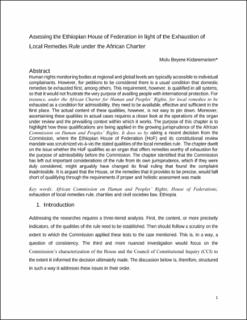Assessing the Ethiopian House of Federation in the Light of the Exhaustion of the Local Remedies Rule under the African Charter
Chapter
Accepted version
Permanent lenke
https://hdl.handle.net/11250/2738870Utgivelsesdato
2020Metadata
Vis full innførselSamlinger
- Faculty of Law [2479]
- Registrations from Cristin [9791]
Originalversjon
In Implementation of International Human Rights Commitments and the Impact on Ongoing Legal Reforms in Ethiopia, 2020, 326–358 https://doi.org/10.1163/9789004415966_015Sammendrag
Human rights monitoring bodies at regional and global levels are typically accessible to individual complainants. However, for petitions to be considered there is a usual condition that domestic remedies be exhausted first, among others. This requirement, however, is qualified in all systems, so that it would not frustrate the very purpose of availing people with international protection. For instance, under the African Charter for Human and Peoples’ Rights, for local remedies to be exhausted as a condition for admissibility, they need to be available, effective and sufficient in the first place. The actual content of these qualities, however, is not easy to pin down. Moreover, ascertaining these qualities in actual cases requires a closer look at the operations of the organ under review and the prevailing context within which it works. The chapter aims to highlight how these qualifications are being applied in the growing jurisprudence of the African Commission on Human and Peoples’ Rights. It does so by taking a recent decision from the Commission, where the Ethiopian House of Federation (HoF) and its constitutional review mandate was scrutinized vis-à-vis the stated qualities of the local remedies rule. The chapter dwelt on the issue whether the HoF qualifies as an organ that offers remedies worthy of exhaustion for the purpose of admissibility before the Commission. The chapter identified that the Commission has left out important considerations of the rule from its own jurisprudence, which if they were duly considered, might arguably have changed its final ruling that found the complaint inadmissible. It is argued that the House, or the remedies that it provides to be precise, would fall short of qualifying through the requirements if proper and holistic assessment was made.
